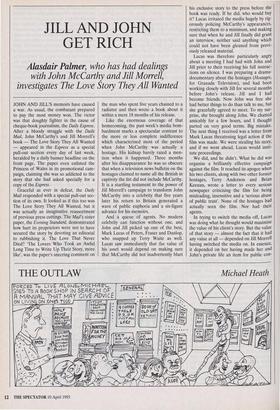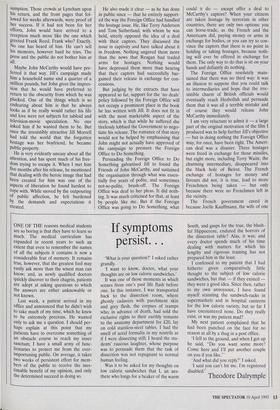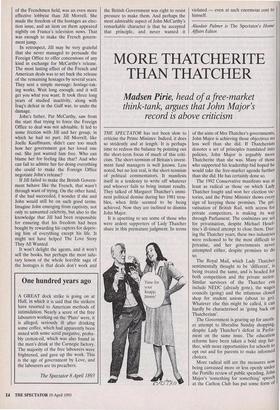JILL AND JOHN GET RICH
Alasdair Palmer, who has had dealings
with John McCarthy and Jill Morrell, investigates The Love Story They All Wanted
JOHN AND JILL'S memoirs have caused a war. As usual, the combatant prepared to pay the most money won. The victor was that doughty fighter in the cause of cheque-book journalism, the Daily Express. After a bloody struggle with the Daily Mail, John McCarthy's and Jill Morrell's book — The Love Story They All Wanted — appeared in the Express as a special pull-out section every day of last week, heralded by a daily banner headline on the front page. The paper even enlisted the Princess of Wales in its promotional cam- paign, claiming she was so addicted to the story that she had asked specially for a copy of the Express. JOHN AND JILL'S memoirs have caused a war. As usual, the combatant prepared to pay the most money won. The victor was that doughty fighter in the cause of cheque-book journalism, the Daily Express. After a bloody struggle with the Daily Mail, John McCarthy's and Jill Morrell's book — The Love Story They All Wanted — appeared in the Express as a special pull-out section every day of last week, heralded by a daily banner headline on the front page. The paper even enlisted the Princess of Wales in its promotional cam- paign, claiming she was so addicted to the story that she had asked specially for a copy of the Express.
Graceful as ever in defeat, the Daily Mail responded with a special pull-out sec- tion of its own. It looked as if this too was The Love Story They All Wanted, but it was actually an imaginative reassortment of previous press cuttings. The Mail's sister paper, the Evening Standard, demonstrated how hurt its proprietors were not to have secured the story by devoting an editorial to rubbishing it. The Love That Never Died? The Lovers Who Took an Awful Long Time to Write Up Their Story, more like', was the paper's sneering comment on
the man who spent five years chained to a radiator and then wrote a book about it within a mere 18 months of his release.
Like the enormous coverage of that homecoming, the past week's media bom- bardment marks a spectacular contrast to the more or less complete indifference which characterised most of the period when John McCarthy was actually a hostage. His kidnap barely rated a men- tion when it happened. Three months after his disappearance he was so obscure that when a television news bulletin on the hostages claimed to name all the British in captivity the list did not include McCarthy. It is a startling testament to the power of Jill Morrell's campaign to transform John McCarthy into a celebrity that five years later his return to Britain generated a wave of public euphoria and a six-figure advance for his memoirs.
And a queue of agents. No modern celebrity can function without one, and John and Jill picked up one of the best, Mark Lucas of Peters, Fraser and Dunlop, who snapped up Terry Waite as well. Lucas saw immediately that the value of his asset would depend on making sure that McCarthy did not inadvertently blurt his exclusive story to the press before the book was ready. If he did, who would buy it? Lucas irritated the media hugely by rig- orously policing McCarthy's appearances, restricting them to a minimum, and making sure that when he and Jill finally did grant an interview, neither said anything which could not have been gleaned from previ- ously released material.
Lucas was therefore particularly angry about a meeting I had had with John and Jill prior to their receiving his full instruc- tions on silence. I was preparing a drama- documentary about the hostages (Hostages, for Granada Television), and had been working closely with Jill for several months before John's release. Jill and I had become friends. Now John was free she had better things to do than talk to me, but she gracefully agreed to meet. To my sur- prise, she brought along John. We chatted amicably for a few hours, and I thought parted on very good terms. Big mistake. The next thing I received was a letter from Mark Lucas threatening legal action if the film was made. We were stealing his story, and if we went ahead, Lucas would insti- tute proceedings.
We did, and he didn't. What he did was organise a brilliantly effective campaign against the film. It reached its apogee when his two clients, along with two other former hostages, Terry Anderson and Brian Keenan, wrote a letter to every serious newspaper criticising the film for being misleading, insensitive and a 'serious abuse of public trust'. None of the hostages had actually seen the film. Nor had their agents.
In trying to switch the media off, Lucas was doing what he thought would maximise the value of his client's story. But the value of that story — almost the fact that it had any value at all — depended on Jill Morrell having switched the media on. In essence, it depended on her having made her and John's private life an item for public con
-
sumption. Those crowds at Lyneham upon his return, and the front pages that fol- lowed for weeks afterwards, were proof of her success. If it had not been for her efforts, John would have arrived to a reception much more like the one which greeted Frank Reed. Frank who? Exactly. No one has heard of him. He can't sell his memoirs, however hard he tries. The press and the public do not bother him at all.
Maybe John McCarthy would have pre- ferred it that way. Jill's campaign made him a household name and a quarter of a million pounds, but John gives the impres- sion that he would have preferred to return to the obscurity from which he was Plucked. One of the things which is so endearing about him is that he always looks as if he really would rather his life and love were not subjects for tabloid and television-movie speculation. No one asked him if he wanted them to be. But once the irresistibly attractive Jill Morrell had told the world that the forgotten hostage was her boyfriend, he became Public property.
He is very evidently uneasy about all the attention, and has spent much of his free- dom trying to escape it. When I met him five months after his release, he mentioned that dealing with the heroic image that had been created for him was one of the aspects of liberation he found hardest to cope with. While moved by the outpouring of public affection, he felt burdened by the demands and expectations it created.
He also made it clear — as he has done in public since — that he entirely support- ed the way the Foreign Office had handled the hostage issue. He, like Terry Anderson and Tom Sutherland, with whom he was held, utterly opposed the idea of a deal with their captors. They discussed the issue in captivity and have talked about it in freedom. Nothing angered them more than the news that Reagan had traded arms for hostages. Nothing would have depressed them more than hearing that their captors had successfully bar- gained their release in exchange for con- cessions.
But judging by the extracts that have appeared so far, support for the 'no deals' policy followed by the Foreign Office will not occupy a prominent place in the book he has written with Jill. It does not fit in with the most marketable aspect of the story, which is that while he suffered she tirelessly lobbied the Government to nego- tiate his release. The romance of that story would not be helped by emphasising that John might not actually have approved of the campaign to pressure the Foreign Office to Do Something.
Persuading the Foreign Office to Do Something galvanised Jill to found the Friends of John McCarthy, and sustained the organisation through what was essen- tially five years of polite, and sometimes not-so-polite, brush-off. The Foreign Office was deaf to her pleas. It did noth- ing. It was much criticised for that, at least by people like me. But if the Foreign Office was going to Do Something, what could it do — except offer a deal to McCarthy's captors? When your citizens are taken hostage by terrorists in other countries, there are only two options: you can horse-trade, as the French and the Americans did, paying money or arms in exchange for bodies, or you can try to con- vince the captors that there is no point in holding or taking hostages, because noth- ing will ever be offered in exchange for them. The only way to do that is sit on your hands and defiantly do nothing.
The Foreign Office resolutely main- tained that there was no third way: it was an illusion to suppose that you could talk to intermediaries and hope that the irre- sistible charm of British officials would eventually reach Hezbollah and persuade them that it was all a terrible mistake and of course they would release John McCarthy immediately.
I am very reluctant to admit it — a large part of the original motivation of the film I produced was to help further Jill's objective — but in doing nothing the Foreign Office may, for once, have been right. The Ameri- can deal was a disaster. Three hostages were freed in exchange for those missiles, but eight more, including Terry Waite, the charming intermediary, disappeared into the black hole of Beirut. The French exchange of hostages for money and favours did not, it is true, lead to more Frenchmen being taken — but only because there were no Frenchmen left in the vicinity.
The French government caved in because JoeIle Kauffmann, the wife of one of the Frenchmen held, was an even more effective lobbyist than Jill Morrell, She made the freedom of the hostages an elec- tion issue, and an item on them appeared nightly on France's television news. That was enough to make the French govern- ment jump.
In retrospect, Jill may be very grateful that she never managed to persuade the Foreign Office to offer concessions of any kind in exchange for McCarthy's release. The most lasting effect of the French and American deals was to set back the release of the remaining hostages by several years. They sent a simple message: hostage-tak- ing works. Wait long enough, and it will get you what you want. It took three long years of studied inactivity, along with Iraq's defeat in the Gulf war, to undo the damage.
John's father, Pat McCarthy, saw from the start that trying to force the Foreign Office to deal was not advisable. It led to some friction with Jill and her group, in which he had no part. Jill Morrell, like Joelle Kauffmann, didn't care too much how her government got her loved one out. She just wanted him free. Who can blame her for feeling like that? And who can fail to admire her for doing everything she could to make the Foreign Office negotiate John's release?
If Jill failed to make the British Govern- ment behave like the French, that wasn't through want of trying. On the other hand, if she had succeeded, I wonder if she and John would still be on such good terms. Imagine John emerging from captivity, not only to unwanted celebrity, but also to the knowledge that Jill had been responsible for ensuring that his freedom had been bought by rewarding his captors for depriv- ing him of everything except his life. It might not have helped The Love Story They All Wanted.
It won't delight the agents, and it won't sell the books, but perhaps the most salu- tary lesson of the whole horrible saga of the hostages is that deals don't work and
One hundred years ago
A GREAT dock strike is going on at Hull, in which it is said that the strikers have resorted to American methods of intimidation. Nearly a score of the free labourers working on the 'Plato' were, it is alleged, seriously ill after drinking some coffee, which had apparently been mixed with some acrid purgative, proba- bly croton-oil, which was also found in the men's drink at the Carnegie factory. The majority of the free labourers were frightened, and gave up the work. This is the age of government by Love, and the labourers are its preachers.
The Spectator 8 April 1893 the British Government was right to resist pressure to make them. And perhaps the most admirable aspect of John McCarthy's remarkable character is that he accepted that principle, and never wanted it violated — even at such enormous cost to himself.
Alasdair Palmer is The Spectator's Home Affairs Editor.




























































 Previous page
Previous page